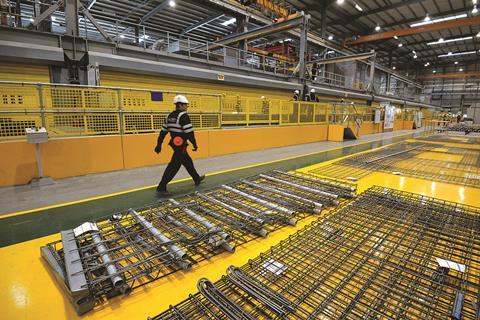Contracting and the wider industry has to get to grips with the way builders do business – beginning with the amount of money they make. Otherwise, what’s the point? writes Dave Rogers

If you Google “ISG” at the moment you see that among the recently searched for phrases are the words: “ISG in trouble”.
It’s not a great look for any company to have that appear in a web trawl but the rumours about the firm’s financial health have come and gone in recent months.
Last autumn, it took the company several weeks to formally deny there was anything amiss after stories circulated there was something wrong at the firm.
It was only when it emerged in the middle of November that chief executive Matt Blowers had met up with three London cost consultants, as part of a drive with “stakeholders” to scotch the rumours, that ISG was forced to go public.
Some privately questioned the initial strategy of saying nothing – given that it was early October that the stories began to emerge. One industry boss commented at the time: “They should have got on top of it from the off, addressed it, calmed things down and moved on.” Eventually, ISG did end up going down that route.
Last Friday morning, the rumour mill cranked back into action. Blowers was supposed to have left the firm, along with chief financial officer Karen Booth. The story was confirmed three hours later with a statement to the press at 10am. This was released at the same time as Blowers’ successor, Zoe Price, was telling staff of the changes via a Zoom call.
Construction is nationally important but it does feel right now that too many firms are grubbing along, trying to make ends meet
And then there were the financial rumours again, but this time worries abated quickly amid suggestions the business had been given a fresh injection of cash from its US owners, which should help for now.
The thing is, though, ISG is not atypical, its issues don’t make it an outlier among contractors.
Price, whose background is in marketing, herself seemed to acknowledge this when, in her first public words as the firm’s new boss, she said: “I’m determined to seek to more fundamentally reset how our business, and the wider industry responds to the growing challenges to our sector. That is going to take different thinking. We cannot expect to attract the talent and creativity our sector needs to thrive, through the continuation of behaviours and approaches that deliver the status quo.” No banal “exciting times ahead” platitudes here.
Some might bristle, given she has to fix ISG first, but, nonetheless, she has a point.

When those rumours about ISG first surfaced last autumn, here are some of the industry events that have happened since: MJ Lonsdale went into administration, a few weeks after Buckingham similarly collapsed. Between them, more than 700 jobs went.
The country’s biggest private contractor by some distance, Laing O’Rourke, racked up a £288m pre-tax loss, which it blamed on three problem contracts. The HS2 leg from Birmingham to Manchester got cancelled and last week a company called Readie, a £400m turnover firm which specialised in the unglamorous world of warehouses and logistics, sank with 160 jobs lost – although the truly shocking thing was the revelation that its pre-tax profit margin in its last set of accounts was 0.4%. Put another way, for every £100 of income it made 40 pence. Frankly, why bother?
>> Also read: Firms going bust, millions lost and all for a next-to-nothing margin. Who in their right mind would want to be a contractor?
>> Industry should look in the mirror: Laing O’Rourke’s losses do no one any good
But some firms do and carry on like this and construction will be heading for the knacker’s yard.
Earlier this month, Ardmore said it fell to its first loss in seven years last year, which it blamed on supply chain failures, delayed contract awards and problem jobs.
But buried in the accounts of the £400m turnover firm, there was something which its managing director Patrick Byrne said which caught the eye.
He wrote: “The failure of major UK contractors has alarmed the supply chain, credit market and customers alike. The bond market has also become much more cautious because of these failures.” In other words, the industry is spooked.

In the same week Ardmore said it went £11m into the red, MPs on the public accounts committee were suggesting “contractors [be] incentivised to minimise costs” on HS2. No one is suggesting it should be a free-for-all, especially with taxpayers’ money, but contractors do seem to be singled out on this scheme. Is the fault of HS2’s overspend really all down to greedy contractors? Or are they just easier, more visible, to blame?
Here, it’s worth pointing out that HS2 contractor Balfour Beatty made a pre-tax margin of 3.2% in its last set of annual results on profit up 70%. In its last set of annual results, HS2 architect Grimshaw made a margin of 6.6% on profit down 20% – ironically, in part caused by the government mothballing the HS2 station at Euston for two years. Balfour Beatty often says its margin is industry-leading – but it is still half that of the architect, whose profit fell significantly. But it’s the contractors being told to cut costs.
Construction is nationally important but it does feel right now that too many firms are grubbing along, trying to make ends meet.
Last month, insolvency specialist Begbies Traynor found that more than 47,000 firms, construction or otherwise, were on the “edge of collapse” in the final three months of last year, with the amount in construction up by one third in just three months.
Begbies said it had “serious concerns” over the construction and real estate sectors which represent nearly 30% of all businesses in critical financial distress. Construction also topped the top 10 of firms in significant financial distress with just over 83,000 firms.
“For many businesses, I fear soldiering on will prove to be one step too far and I expect thousands of debt-laden businesses to start to fail this year,” was executive chairman Ric Traynor’s gloomy prediction.
Too often in recent months, soldiering on is what construction appears to have been doing. Price has issues to deal with at ISG – chief executives don’t leave suddenly if everything is tickety-boo – that much is clear. She is, though, right that carrying on in the same way is simply not sustainable. One definition of madness is doing the same thing time and again and expecting a different result.
The travails of ISG and Laing O’Rourke, which is letting close to 20% of staff at its offiste factory go, matter because, while they are issues to be dealt with by those firms, they are a snapshot into construction’s long-standing problems. Those firms don’t operate in isolation, their problems aren’t peculiar to them. Bad decisions may have been made but, as Price said, all that “the continuation of behaviours and approaches [will do is] deliver the status quo”.
How to fix it is another matter. Many years ago, when site deaths were rocketing, the then deputy prime minister John Prescott called an emergency health and safety summit to bang heads together. It seemed to work. Maybe something similar is required now for an industry that is of strategic importance.
Remember, ISG is fitting out the offices of Google, it will build a new prison in Buckinghamshire for the government and hopes to build a factory that will make car batteries for Jaguar Land Rover.

“The construction model is broken and unfit for a modern economy,” a recent post on LinkedIn began. “I’ve been in construction seven years and [am] still shocked at the lack of learning and improvement despite the industry acknowledging [things need to change].
“But there needs to be a willingness to do things differently which for many businesses is just a marketing soundbite not built into actionable strategy. And the entire construction ecosystem needs to put competition to one side and do this together.”
Helen Gawor, who happens to be ISG’s group director of strategy and innovation, is surely speaking for many.
Dave Rogers is Building’s deputy editor



























No comments yet